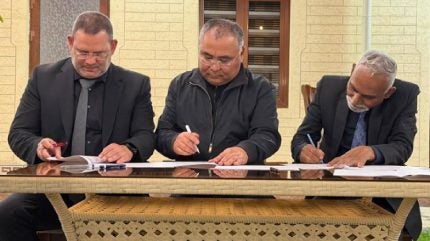
The collaboration was formalised when Uzbekistan Agriculture Minister, Dr Ibrokhim Abdurakhmonov, visited ICAC headquarters in Washington, DC, accompanied by senior officials Javlon Raimov and Abrorbek Kosimov.
During this visit, Dr Abdurakhmonov, ICAC chief scientist Dr Keshav Kranthi and Bizpando CEO Jasper Bhowmick signed a Memorandum of Understanding (MoU) to confirm their joint efforts on the cotton programme.

Discover B2B Marketing That Performs
Combine business intelligence and editorial excellence to reach engaged professionals across 36 leading media platforms.
Before the MoU, Dr Kranthi held a three-day training at the Cotton Research Institute in Uzbekistan’s capital, Tashkent, from 21 to 23 October 2025. This event saw 50 participants, including scientists and government officials from Uzbekistan. The training sessions combined theoretical learning with practical field demonstrations.
This was followed by a one-day field training camp held in Jizzakh on 24 October 2025, conducted by Dr Kranthi and Dr Abdurakhmonov, with attendance from 98 farmers.
Currently, the Ministry of Agriculture is in the process of identifying laboratories for carbon testing accreditation and certification.
The Ministry is consulting Dr Kranthi, who is providing technical guidance on testing standards and accreditation procedures.

US Tariffs are shifting - will you react or anticipate?
Don’t let policy changes catch you off guard. Stay proactive with real-time data and expert analysis.
By GlobalDataBizpando has received a list of participating farmers from the Ministry to begin registration and documentation for carbon payment processes.
As part of the next steps, Bizpando will send its on-site coordinator, Mark Li, to Uzbekistan between 17 and 21 November 2025 to provide training for farmers and government officials on documentation procedures required for verification of carbon credits and payments.
Earlier in March this year, ICAC organised a two-day educational programme with CottonConnect to raise environmental awareness among cotton farmers and promote sustainable practices within the sector.
More than 80 stakeholders participated in this event, including local partner teams. The sessions provided information about greenhouse gas emissions assessment and reduction strategies for agricultural environments.





